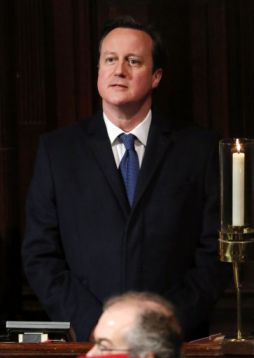Easter, David Cameron and 'doing God'

The relationship between politicians and Christianity has always been full of complexity and potential conflict.
As we remember over Good Friday and Easter, Pontius Pilate – the Roman governor – seemed more than willing to release Jesus until the crowd started to invoke Caesar, and to suggest that Pilate's position might be in jeopardy if he failed to go along with their wishes to see the "King of the Jews" executed on a cross.
Much more recently, former spin doctor Alastair Campbell famously declared "we don't do God" when the former Prime Minister Tony Blair was asked about his beliefs. Now the current Prime Minister, David Cameron, has offered us his take on all this, volunteering the information that his Government would "do God" but "in a limited and responsible way". Alluding to Campbell's remarks, Mr Cameron went on: "One of my predecessors said he would not do God. I think we should."
But what does this mean in practice? Does it mean, for example, that the government will review forthcoming changes in benefits in the light of the letter signed by many Anglican bishops recently? Does it mean that ministers will listen to the new criticism from the Bishop of Exeter about their apparent lack of support for family life? Does it mean that the cabinet will listen to Church of England fears about whether government legislation on gay marriage will genuinely protect its clergy from litigation? We all know the answer to these questions, and sadly that answer is "no".
So when David Cameron says his Government will "do God" but "in a limited and responsible way", it is hard to see that it means anything at all really – apart from the fact that he is prepared to show up at events such as the enthronement of the Archbishop of Canterbury, and make vague but non-specific supportive remarks about the Christian faith.
The problem is that Good Friday and Easter point us to a God whose character and nature demand a response consisting of actions as well as words – life-service, if you want, rather than just lip service. Jesus shrewdly points out to Pilate that the governor is himself accountable to a power beyond the Roman Emperor: "You would have no power over me," he tells him, "unless it had been given you from above," (John 19v11).
And after his resurrection, the words of Jesus are quite clear – and startling: "All authority in heaven and on earth has been given to me," he tells his friends in Matthew 28v16. "Therefore go and make disciples..." This is a God who, in Christ, calls us to whole-life discipleship in response to his authority – not "doing God in a limited and responsible way" as though He were a hobby such as woodwork.
The words of the first Bishop of Liverpool, JC Ryle, commenting in the 19th century on Pontius Pilate's role at Easter, seem strangely prophetic today: "Men like Pontius Pilate, who are always trimming and compromising, led by popular opinion instead of leading popular opinion, afraid of doing right if it gives offence, ready to do wrong if it makes them personally popular, such men," he wrote, "are the worst governors that a country can have." And he said: "Let us pray that our own country may never be without men in high places who have grace to think right, and courage to act up to their knowledge, without truckling to the opinion of men. Those who fear God more than man, and care for pleasing God more than man, are the best rulers of a nation, and in the long run of years are always most respected."











